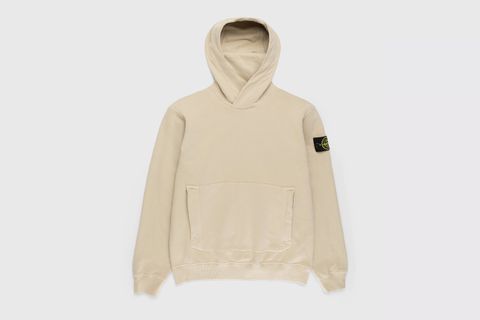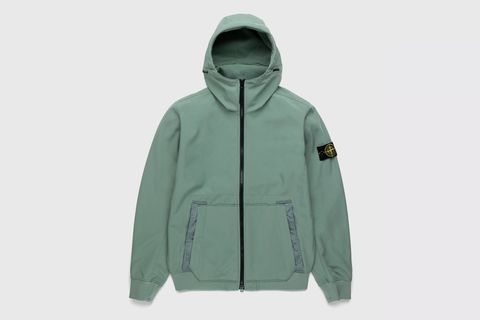Drake & Streetwear Are Ruining Stone Island for Soccer Fans
Stone Island’s brand history has been told and retold countless times over the past couple of years since the twin forces of Drake and Supreme propelled it to new heights of mainstream visibility. In case you’re one of the few people not in the loop, here’s a quick summary: back in the mid-1980s, English soccer (aka football) hooligans adopted the then-obscure Italian sailing label as a de facto uniform. They exported it back home where it would later be picked up by myriad other scenes, thus weaving it firmly into the fabric of British popular culture.
In the three decades since, the brand has expanded outwards far beyond the boundaries of its original core demographic. These days, you’re just as likely to see that famous compass patch pinned to the arm of a grime MC or well-off, middle-aged men who drive Range Rovers through the posher parts of London as you are on somebody who punches other people over petty sporting rivalries.
Despite this, most people (in Britain, at least) still associate Stoney with the “casuals” scene and this is, in fact, a major part of its appeal: scrawny suburbanites that spend their weekend afternoons on The Basement are drawn to the brand because some of that tough guy hooligan essence is captured in the clothing. Dudes who’ve never been in a fight in their lives buy Stone Island because it lets them simulate a hard man fantasy in their heads every time they catch a reflection of their left sleeve on a shiny surface. But as the brand has grown increasingly mainstream, its new admirers have started to repel its original devotees. The fact is, Drake and the streetwear scene have completely ruined Stone Island for the football thugs.
OK, laying the blame at Drake or Supreme’s feet is a bit harsh – this was a process that started long before the latter was born and the former had made his debut on Degrassi. Stone Island first started to penetrate the mainstream in the mid-90s, when Mancunian rock band, Oasis, were at the peak of their popularity. The Gallagher brothers, who were the heart and soul of the band, are devout Manchester City supporters and rumor has it that Noel used to go to matches with some of the more questionable characters in Citeh’s fan base himself.
They could regularly be seen sporting the sort of clothes that you used to see in football stadiums at the time and Oasis were probably the first ones to introduce casual fashion and terrace wear to the wider British public. With their loutish, beer-swilling ways, Liam and Noel Gallagher became role models for an entire generation of young men and helped birth a phenomenon called "the new lad” – a subsegment of adolescent and twentysomething males who had a penchant for football, “lads' mags” like Loaded, football and sexist humor. So, guys who tried their hardest to mimic the Gallagher brothers, basically.
The new lads might have dressed like the casuals, but in reality they were mainly middle class and more inclined towards boisterousness than violence. They might have aped the behaviors or imitated the accents of snarling blue collar louts like the Gallaghers or Chelsea hooligans, but that was pure front: they weren’t going to suck the eyeball out of anyone’s head after knocking them unconscious, as one Manchester United sociopath is alleged to have done (if you believe the stories that is, although I’m a skeptic).
For the casuals of the ‘80s, Stone Island’s obscurity was a major part of its appeal: that one-upmanship of being the best dressed, of sourcing a rare piece, of being the first to discover a new brand, were as much a part of football casual culture as fighting. Going mainstream completely soured it for them, and some, like Phil Thorton, a former Manchester United hooligan and author of Casuals: Football, Fighting and Fashion, stopped wearing it altogether.
“Today, Stone Island has suffered from the plethora of shite hooligan films that have featured the label and its international reputation as the hooligan brand,” Phil told me once in an interview. “The 90s 'New Lad' culture also had a negative effect on those of us that pride ourselves on not being part of any fashion herd. I personally wore angler oilskins with hiking boots around the mid-90s, as these were the baggiest pants I could find in an era when skinny Armani, Valentino jeans were de rigeur. It wasn't uncommon to see football mobs dressed as if they were heading for base camp at K2 rather than an away trip to West Ham.”
My own experiences of going to football matches almost a decade ago were similar. Although Stone Island was still broadly popular, certainly the most widely worn of the designer labels, it was usually younger guys or poseurs that wore it. The older guys who used to get into punch ups in the ‘80s had other priorities in life now that they had reached middle age and had kids to provide for and mortgages to pay off, and those that were really looking for a fight rather than just posturing avoided Stoney because it attracts too much attention. Back then, around 2009, Prada and Barbour were the connoisseur's choice, while many simply opted for outdoor apparel by brands like Columbia.
I’ve lost touch with a lot of those guys that I used to see on match day but I can only imagine how they would react to the sight of Drake strutting around Wimbledon or Gully Guy Leo striking a pose for Instagram whilst wearing Stone Island.
Although I’m a fan of Drizzy, he’s arguably the softest rapper in the game and was once described as “the only n*gga on earth capable of turnin’ sandpaper into moist towelettes wit the touch of his hands.” While I can’t attest to the scientific credibility of that statement, I can say with absolute certainty that lyrics like “Everything that I write is either for her or about her” would see Drake stripped of his Stone Island clobber and laughed out of a Millwall pub were he ever to have to audacity to step foot in one. Britain is an emotionally constipated nation still suffering from a very Victorian stiff upper lip. Being as forthright with your feelings as Drake is would be frowned upon in most segments of society, let alone in the hyper-masculine environment of football fandom where it’s utterly taboo.
For all of the urban blight that we associate with streetwear, the fact is that the scene itself is totally suburban. The kids you see lining up outside of Supreme or Palace on drop day appear to mainly be in their teens. Now compare that to the sort of lunatics you might see getting into punch-ups with police at football matches. The difference in toughness is stark and it becomes abundantly clear why casuals have gone off Stoney.
For some, however, Stoney’s gentrification has been a cause for celebration: the brand itself has tried very hard to shake its association with the undesirable elements in its fan base. I remember when I wrote about its connection to the casuals scene several years ago, a PR agent working for the brand sent me a sternly worded email that read:
“We were disappointed to read your article about Stone Island … we do not support any association between Stone Island and football violence. The relationship between the brand and football fans is undeniable but as the UK representatives for Stone Island we work hard to focus on the communication of the brand as leaders in innovative design and research in men’s sportswear.”
This is understandable, but the fact is that Stone Island wouldn’t enjoy nearly the same profile without its association to the casuals scene: there’s a reason why it’s far more popular than its competitors and that can’t be down to its otherworldly fabrics alone.
People don’t just buy a product, they buy the myth associated to it. If they didn’t, the advertising industry wouldn’t exist. You’d have to be an idiot to think that the brand condones violence of any sort, but to try pretend that hooliganism hasn’t been good for its bottom line is utterly delusional.
Now here's how you can spot fake Stone Island.








